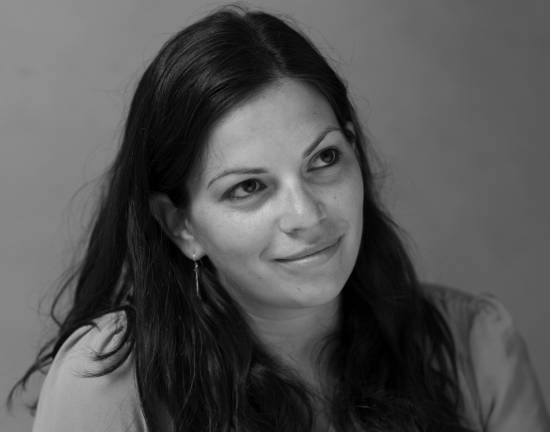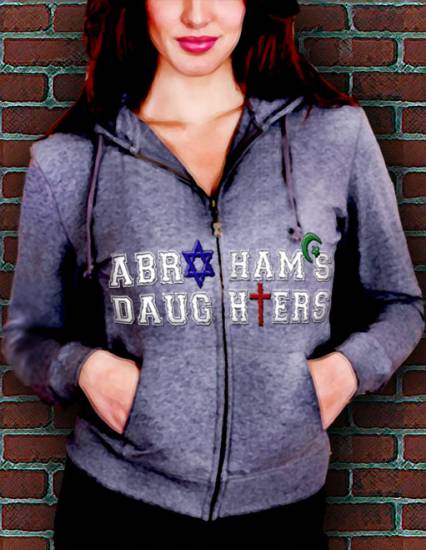
Elissa Lerner investigates religious differences in unique ways in ABRAHAM’S DAUGHTERS, part of the 2010 Fringe Festival (photo by Kaija B. Braus)
ABRAHAM’S DAUGHTERS
New York International Fringe Festival
SoHo Playhouse
15 Vandam St.
Sunday, August 15, 7:15; Tuesday, August 17, 5:45; Saturday, August 21, 4:45; Wednesday, August 25, 9:45; Saturday, August 28, 6:00
Tickets: $15-$18
866-468-7619
www.abrahamsdaughterstheplay.com
www.fringenyc.org
Forest Hills native Elissa Lerner headed south for college, graduating cum laude in religion and theater studies from Duke University. She put those disciplines together for her honors thesis, ABRAHAM’S DAUGHTERS, a provocative play that has been selected to be part of the fourteenth annual New York International Fringe Festival. Produced by Lerner and directed by Niccolo Aeed, ABRAHAM’S DAUGHTERS follows the changing personal and sexual relationships among a group of students at a southern university, including the Jewish Sara (Rebecca LaChance), the Muslim Ranya (Déa Julien), the Methodist Kate (Keely Flaherty), and the atheist Will (Ayreh Lappin). Earlier this week, Lerner, who is also a freelance journalist working on her master’s at NYU, took a break from her hectic production schedule to discuss Duke, religious politics, and being at the Fringe.
twi-ny: ABRAHAM’S DAUGHTERS has been influenced by stops in Qatar and Israel, among other locations. Currently, in New York City, there is a debate going on about the potential building of a mosque near Ground Zero, and there are more and more protests against Israeli actions, especially on college campuses. Where does the play fit in the ongoing battle over religious freedom and interfaith dialogue?
Elissa Lerner: That’s a great question, and an important one. One of the things the director and I have talked about with regard to ABRAHAM’S DAUGHTERS is that the play is about interfaith dialogue but it’s not a conversation full of buzzwords and catchphrases, ie., Muslims have lives that don’t have to circuitously relate to 9/11 just as Jews aren’t necessarily defined by Israel around the clock (and Christians have lives that are not reduced to fundamentalist caricatures). Where the play succeeds, I hope, is that it tells an honest story of individuals and their relationships to each other and how their faiths influence them in both conscious and unconscious ways. I think this is where the audience will be able to relate to the characters — not because of a shared religious ideology masquerading as politics (or vice versa) but because all of us have personal relationships to our religious (or irreligious or areligious) backgrounds, and hopefully this will be a welcome forum to turn a critical eye and sensitive ear.

twi-ny: What does it mean to you to be part of the New York Fringe Festival?
EL: It’s incredibly exciting to be a part of the Fringe. I had a few friends involved in the Fringe last year and I thought, wow, this seems like a great opportunity, I wonder if I could make it? So when I found out ABRAHAM’S DAUGHTERS made it in this year, it was very gratifying to be considered among a pool of extremely talented artists from around the city, the country, and even the world. I’m just really proud and honored to have the chance to be a part of that.
twi-ny: What was a nice Jewish girl like you doing in a place like Duke? You seem to have shaken up both the religion and theater departments while you were there. What was that experience like?
EL: That’s funny! There is certainly a lingering perception among northern Jews about Duke, but I found it to be, well, unfounded. One of the things I loved most about my time there was that Duke brings together students from all over the country — Jews included. It was great meeting Jews from places like Texas and Alabama and comparing notes. But at the same time, for example, I relished getting to know grad students who had gone to bible colleges and were preparing for Christian ministry. It was just completely different exposure than what I had known growing up in New York City. And as for shaking up departments — one of the first things I was told as a freshman was that Duke is proud of its traditions but equally proud of creating new ones. With that in mind a few years later, I thought perhaps the religion and theater studies departments would be open to an unusual honors project proposal. It did take some convincing — but any viable honors project should take some convincing to prove to faculty that you’re serious. And at the end of the day, it was (and continues to be) extremely rewarding to see that this crazy idea really does have legs.